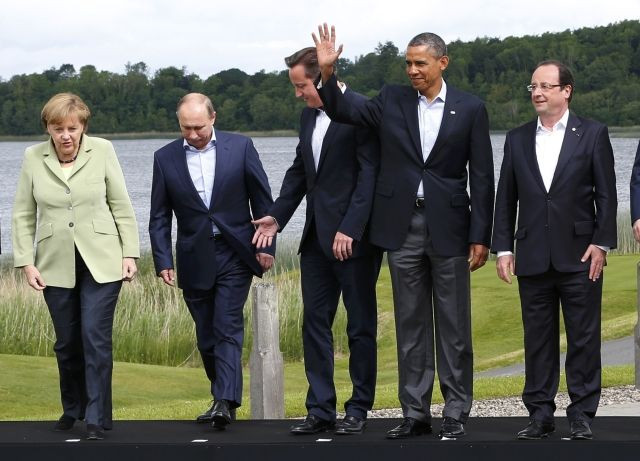Russia Won't Be At The G-7 Meeting This Week But Its Energy Supply Will Be A Major Topic

World leaders will gather in Brussels this week at the annual G-7 meeting without Russia being present for the first time in 17 years, and European energy security in the face of Russia’s meddling in Ukraine will be a hot topic in the region grown increasingly anxious as an ongoing price dispute between Russian gas producer Gazprom and Ukraine’s government threatens to halt natural gas shipments amid growing continental demand.
"In Europe, we are facing the risk of seeing the lights going off," Fatih Birol, chief economist of the International Energy Agency (IEA), said a press conference held Tuesday to release a report that warned Europe could face power shortages if utility companies and oil producers fail to respond to rising demand. "We don't see the appetite in many utilities to invest" as they struggle to make a profit under current regulations aimed at reducing carbon emissions, he said.
The European Union is dependent on Russian gas and pipelines through Ukraine to meet more than a third of its energy import needs. G-7 energy ministers met in May in Rome and released a joint statement committing to “improve energy security at national, regional, and global levels.” But improving energy security will require a balance of diversifying commodities and combating climate change, two priorities of the G-7 nations that can conflict.
European reliance on Russian natural gas is in large part a self-inflicted wound, according to Gal Luft, co-director of the Institute for the Analysis of Global Security, because the region has largely rejected sources of base load electricity like coal, nuclear power and unconventional gas, utilizing Russian gas to supply its energy demand.
G-7 leaders are expected to voice support for Ukraine’s newly elected president and discuss ways to improve European energy security, whether to impose more aggressive sanctions against Russia and ways to combat climate change.
“The G-7’s continued prioritization of climate policy is sure to prolong the Kremlin’s stronghold over Europe’s energy security,” Luft wrote.
On Monday, the Obama administration unveiled a proposed regulation of U.S. power plant emissions that set off the beginning of a national battle over climate change and coal.
A highly publicized U.N. report concluded in March that weather patterns are already changing on every continent and that the problem is likely to grow worse unless greenhouse gas emissions are substantially reduced.
The G-7 meeting is a prime opportunity for the world leaders to collaborate on climate change policy ahead of a U.N. summit on climate change in September, where negotiating global standards will be much more difficult.
Meanwhile, Russian state-controlled gas company Gazprom, Ukraine’s government and Europe’s energy commissioner continue to negotiate the price of Russian gas.
Kyle Davis, partner at international law firm Goltsblat BLP specializing in energy and natural resources, thinks the gas dispute will likely be resolved without a supply cut-off.
“The EU energy commission is just maintaining Europe's longstanding practice going back to Cold War times of keeping the gas business and geopolitics in separate compartments,” he said. “Today's level of East-West tension is much lower than during the Pershing missile crisis in the '80s, throughout which Russia remained a reliable gas supplier and the Europeans kept paying on time.”
On Wednesday, President Obama will leave Poland for Brussels and meet Belgium’s King Philippe at the Royal Palace before attending a working dinner with colleagues from Great Britain, Germany, France, Italy, Canada and Japan. On Thursday, G-7 officials will have more meetings, which are planned to include trade and climate change. Obama also plans to meet with British Prime Minister David Cameron one-on-one in Brussels before dining with French President Francois Hollande Thursday evening in Paris.
© Copyright IBTimes 2024. All rights reserved.






















